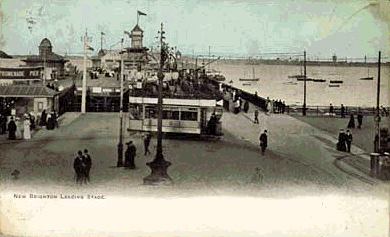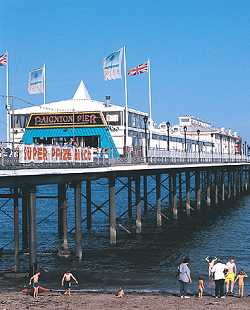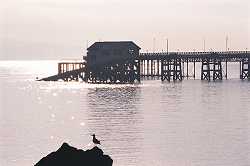 Writing
to the Limit
Writing
to the Limit Writing
to the Limit
Writing
to the Limit
It's holiday time in your seaside town.
The beaches are packed even though it's a blustery day.
you are a journalist. Your editor phones you at 3pm and tells you to get down to South Beach immediately.
When you get there the following events take place - and you have to report them:
| 3.15 | The old steam boat, The Seagull, run by retired sea captain Henry Mann, has run into the pier causing part of it to collapse. People are marooned at the far end, including about 300 people who were watching a variety show in the pier pavilion. |
| 3.20 | The Seagull was fully loaded - there
are estimates of at least 50 people, many young children, some
babies. The boat is listing badly and a fire has started in the
engine room. Oil is leaking into the sea. The end of the pier looks unstable. As you watch, pieces fall into the sea. You can see people waving frantically and shouting for help. |
| 3.25 | The inshore rescue boat is at last launched after a
delay caused by crowds of onlookers on the beach. Other small boats are
helping to take people off The Seagull. It's too far to jump down into the sea from the pier. An onlooker tells you the air- sea rescue helicopter has been called to winch people off. |
| 3.30 | The sea is very choppy. People are still on The Seagull, which is getting lower in the water. Some people have left the boat and are trying to swim to the shore - a distance of some 200 metres. |
| 3.35 | The first passengers are brought ashore, wet and shocked. Some are suffering from cuts and bruises. One woman, Mrs Eileen Thomson, 36, from Barnsley, says: "I thought he was taking on too many. It was really low in the water. He didn't seem to count the kiddies as passengers because they were sitting on their mum's knees. Goodness knows if they're all safe. It was chaos out there. One poor girl was screaming she couldn't find her little boy ... he'd been jolted off her lap when we hit that pier and in the confusion ... it's criminal. They shouldn't allow boats like that. I'm never coming here again. What about those poor people still out there? What a terrible way to end a holiday." |
| 3.50 | The helicopter arrives and starts taking
people off the pier. You talk to a policeman helping to control
anxious crowds on the beach. He confirms their hysteria has been
hampering rescue operations. He also believes that ten people,
including three children, have been taken to hospital so far.
He confirms that an unspecified number are still unaccounted
for, including Henry Mann. As you leave, you overhear one of the local fishermen's wives say, "It was bound to happen one of these days. He's always half cut and my Pete was saying only yesterday how unreliable that old engine was. He never looked after it, did he? |
| 4.00 | You reach the only available telephone
and phone your editor. He is reserving the front page for you, but in order to catch the deadline you must have an article written and complete within fifty minutes. If you write a good article in time, you'll certainly get promotion - if you don't, you'll get the sack! |
Stage 1
1. Make a summary of the facts you
have discovered, in note form. Don't use more than 100 words -
and don't waste time counting them! Choose the useful bits, don't
copy out everything. Throw out the trash and keep the treasure!
2. Write up the
whole story for the front page of your newspaper.
You have only 50 minutes.
You must use 350 words (+/- 20) not including headlines.
Stage 2 (later)
3. Exchange articles with a partner and act as your partner's
editor. Proofread the article, correcting any errors you might
find and suggesting how the article might be improved.
4. Write a headline, lay out the page, divide it into paragraphs with subheadings and provide at least one photograph of the scene (samples below)
You could use the following sample pictures to illustrate your story if you are using ICT.
 |
 |
 |
 |
Return to Main In The News page